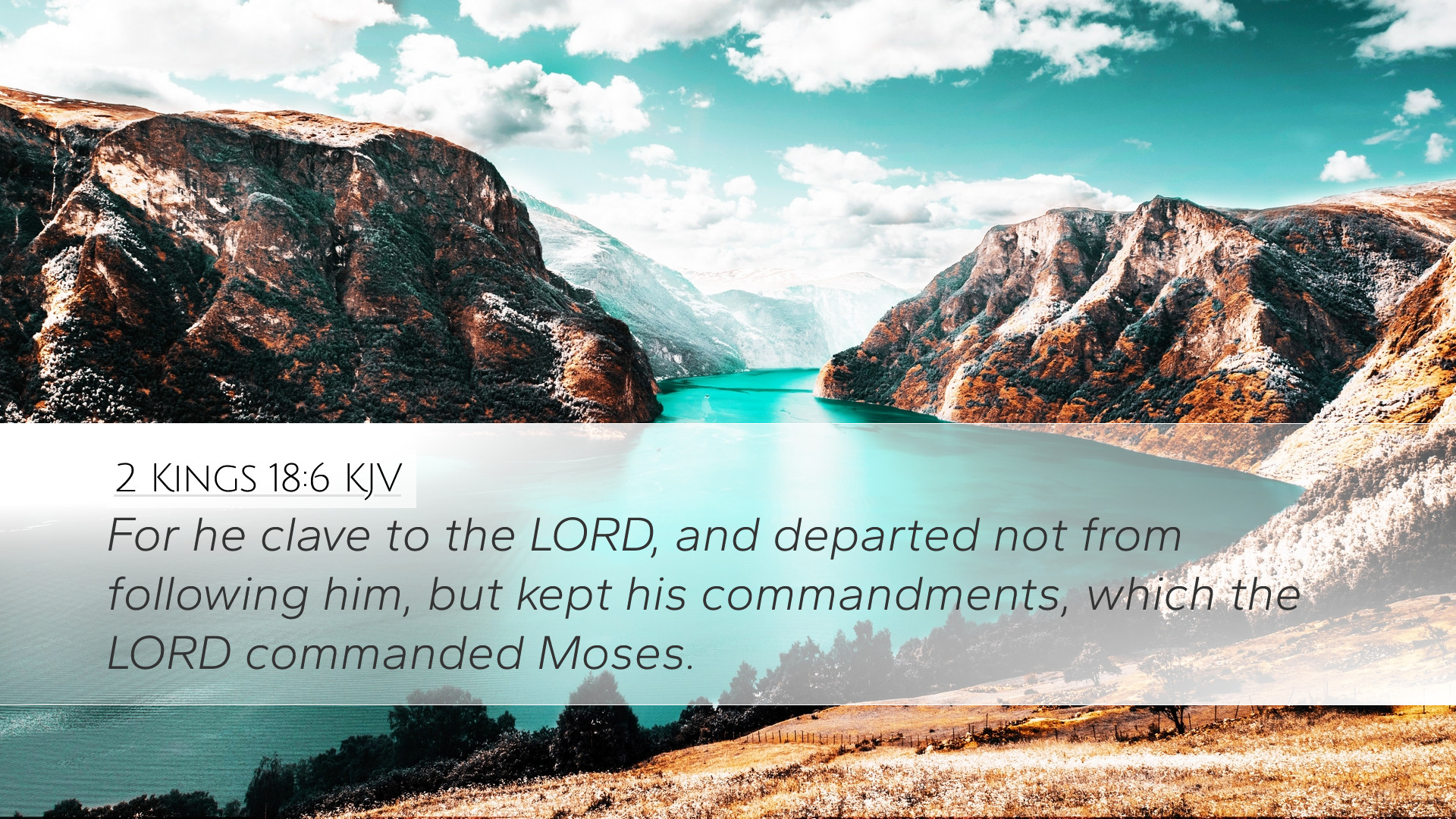Commentary on 2 Kings 18:6
Verse: "For he clave to the LORD, and departed not from following him, but kept his commandments, which the LORD commanded Moses."
Introduction
This verse highlights the faithfulness of King Hezekiah, a ruler of Judah known for his reformative actions and devotion to God. The act of clinging to the Lord is presented as central to his character and reign. Here, we explore the richness of this passage through the lens of public domain commentaries.
Faithfulness to God
Matthew Henry's Insight: Matthew Henry notes that Hezekiah's steadfast faith is characterized by his commitment to the Lord’s covenant. He emphasizes the importance of personal devotion and the implications of a ruler's faith on the people he governs. Henry posits that Hezekiah’s loyalty was not merely an individual pursuit but had communal repercussions.
Albert Barnes' Perspective: Barnes observes that Hezekiah “clave to the Lord,” indicating a strong attachment and loyalty, contrasting with the prior kings who had been less faithful. This relationship with God serves as the foundation of Hezekiah’s reforms, which aimed at restoring proper worship and reliance on Yahweh.
Adam Clarke's Commentary: Clarke suggests that the act of clinging to God implies a trust that goes beyond mere practices—it involves a deep, personal relationship with the Divine. Hezekiah’s devotion is presented as proactive, which reflects both his spiritual maturity and leadership qualities.
Continued Commitment
Hezekiah's refusal to depart from following the Lord indicates a consistency in his faith, reflecting the essence of discipleship.
- Matthew Henry: Stresses the necessity of ongoing commitment in faith, suggesting that true believers should continually strive to live according to God’s will and commandments.
- Albert Barnes: Emphasizes that Hezekiah’s adherence to God’s directives, particularly in following the commandments delivered through Moses, illustrates not just devotion but obedience—a fundamental aspect of covenant relationship.
- Adam Clarke: Points out that a consistent walk with the Lord is crucial not only for the individual but also for his leadership role. Heekiah’s faith was unwavering amidst challenges, which is a model for subsequent leaders and believers.
The Commandments and Their Significance
This aspect of the verse—keeping the commandments—illustrates the foundational role of the Law in the covenant community of Israel.
- Matthew Henry: He highlights that the commandments are not burdensome but vital for the flourishing of God’s people. The observance of these commandments leads to blessings, both personally and corporately.
- Albert Barnes: Barnes discusses the historical context of the commandments, reflecting on how obedience to them was central to Israel's identity and their relationship with God. He emphasizes that Hezekiah’s commitment to these divine laws separates him from his predecessors.
- Adam Clarke: Clarke describes the commandments as an expression of God’s holiness and truth. Hezekiah’s adherence serves as an invitation to the nation of Judah to return to authentic worship and away from idolatry.
Theological Implications
This verse serves as a theological foundation for understanding the interplay between divine sovereignty and human agency.
- Matthew Henry: Hezekiah's reign represents how God’s providence works through faithful leaders to accomplish His purposes. Henry underlines that while God is sovereign, human faithfulness is indispensable.
- Albert Barnes: Barnes reflects on the responsibility of leadership in covenant communities, noting that leaders like Hezekiah have a crucial role in shaping the spiritual direction of their people.
- Adam Clarke: Clarke infers that this faithfulness not only impacts the nation during the reign but also sets a precedent for future generations. It encapsulates a key principle of leadership within the realms of faith.
Conclusion
In summary, 2 Kings 18:6 provides profound insights into the character of Hezekiah as a faithful monarch. Through the analysis of public domain commentaries, we see the multifaceted dimensions of his faithfulness—his personal devotion, unwavering commitment, and adherence to God's commandments. This narrative serves as an exhortation to leaders and believers alike, encouraging a deep, active relationship with God that transcends mere observance of laws. For pastors, scholars, and theologians, Hezekiah’s example remains pertinent in encouraging a vibrant faith that influences both individual lives and broader communities.


